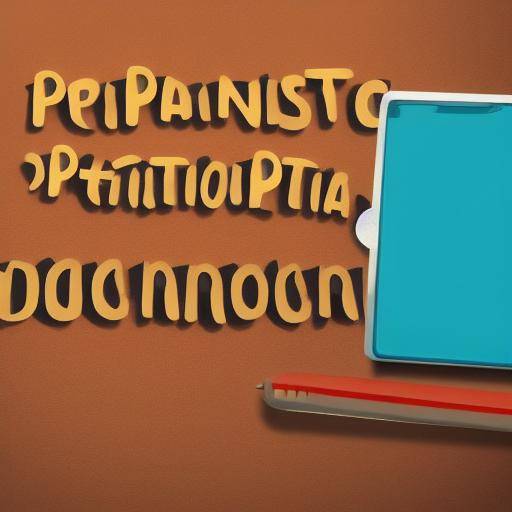
Introduction
Self-discipline is a crucial skill that directly influences our personal development and the ability to set priorities. In a world full of constant distractions, the ability to maintain the approach and make effective decisions becomes critical to achieving success in all aspects of life. In this article, we will explore in depth the role of self-discipline in relation to prioritization and how these skills are intrinsically linked to personal development. We will discover the advantages, challenges, current trends and practical examples that demonstrate how self-disciplinary domination can be the distinguishing factor in achieving our goals.
History and Background
Self-discipline has its roots in antiquity, where philosophers like Séneca and Aristotle advocated the control of impulses and the development of virtues. Over the centuries, this notion has remained relevant, being promoted by various philosophical, religious and psychological flows. From military discipline to the practice of martial arts, self-discipline has played a crucial role in human development. At present, the growing presence of digital distractions and the rapid evolution of the working and social environment have highlighted the importance of dominating self-discipline to effectively prioritize.
Philosophy and self-discipline
Ancient Greek and Roman philosophers understood self-discipline as an essential virtue for ethical and effective life. Aristotle, for example, in his "Ethic to Nicomaco", emphasized the importance of self-control as a basis for all other virtues. Seneca, for his part, saw self-discipline as a means of achieving inner peace and resilience to adversities.
Discipline in military history and martial arts
Self-discipline has been a cornerstone in military formation since ancient times. The Roman armies, known for their rigorous discipline, achieved conquests that shaped history. Similarly, martial arts, developed in cultures such as Japanese and Chinese, integrate self-discipline not only as a technique of combat, but as a philosophy of life.
Deep analysis
Benefits of self-discipline and prioritization
Self-discipline provides remarkable benefits, such as the ability to resist temptation, keep focus on long-term goals and make decisions that favor personal growth. By consciously prioritizing, stress is reduced, productivity increases and a balance between personal and professional life is achieved.
Resistance to temptation
Self-discipline allows to resist the temptation of non-productive activities and focus on long-term value-giving tasks. This resistance is crucial to maintaining progress towards important goals.
Approach to long-term objectives
By cultivating self-discipline, people can keep their attention on long-term goals, avoiding distractions and deviations that can compromise their progress.
Stress reduction
Effective prioritization allows people to better manage their time and resources, reducing overload and stress associated with managing multiple responsibilities.
Challenges of self-discipline and prioritization
Despite benefits, self-discipline and prioritization can be difficult. Procrastination, lack of motivation and constant distractions represent common obstacles that require a conscious effort to overcome.
Procrastination
Procrastination is a common challenge that can undermine self-discipline. Overcoming it requires specific strategies, such as the fragmentation of tasks and the establishment of clear deadlines.
Lack of motivation
Maintaining long-term motivation is crucial for self-discipline. Lack of motivation can be overcome by setting clear and meaningful goals and celebrating small achievements on the road to larger goals.
Constant distractions
In the current digital environment, distractions are omnipresent. Self-discipline involves developing strategies to minimize these distractions and keep the focus on priority tasks.
Current trends
In an increasingly digitalized world, self-discipline has become a growing topic of interest. Specialized applications and tools have been developed to support time management and the promotion of self-discipline.
Digital applications and tools
There are numerous applications designed to help people improve their self-discipline and prioritization. Applications such as Trello, Todoist and Forest offer solutions for task management and focus, helping users stay organized and productive.
Approaches to Modern Psychology
Modern psychology has developed techniques such as Cognitive-Conductual Therapy (TCC) to help people improve their self-discipline by changing patterns of thought and behavior.
Examples and practical cases
Case studies show how people and organizations have achieved important goals by implementing effective strategies for self-discipline and prioritization.
Case study: Technological company
A technology company implemented a program of self-discipline and prioritization for its employees, resulting in a significant increase in productivity and job satisfaction. Employees received training in time management techniques and prioritization tools, enabling them to better manage their projects and reduce labour stress.
Case study: Professional athlete
A professional athlete used self-discipline and prioritization to achieve his sporting goals. By establishing a rigorous training regime and keeping the focus on their long-term goals, the athlete managed to improve their performance and achieve success in international competitions.
Conclusion
Self-discipline and prioritization are essential skills for personal and professional development. In a world full of distractions and challenges, the ability to stay focused and make effective decisions is crucial to achieving success. Through history, self-discipline has proven to be a fundamental virtue, and in the current digital age, its importance is more relevant than ever. By applying self-discipline and prioritization strategies, we can improve our productivity, reduce stress and achieve a healthy balance between personal and professional life.
Frequently asked questions
1. How can I improve my self-discipline?
You can improve your self-discipline by setting clear goals, creating a detailed action plan and using time management tools to keep you organized and focused.
2. What techniques can I use to prioritize my tasks?
Effective techniques for prioritization include the use of priority matrices (such as the Eisenhower matrix), the creation of task lists and the allocation of specific time for each important task.
3. How can I stay motivated in the long term?
Maintaining long-term motivation can be achieved by setting meaningful goals, celebrating small achievements and constantly remembering the purpose behind your actions.
4. What digital tools can help with self-discipline and prioritization?
Applications such as Trello, Todoist and Forest are useful for task management and focus, providing structures and reminders to help you stay disciplined and organized.






















































